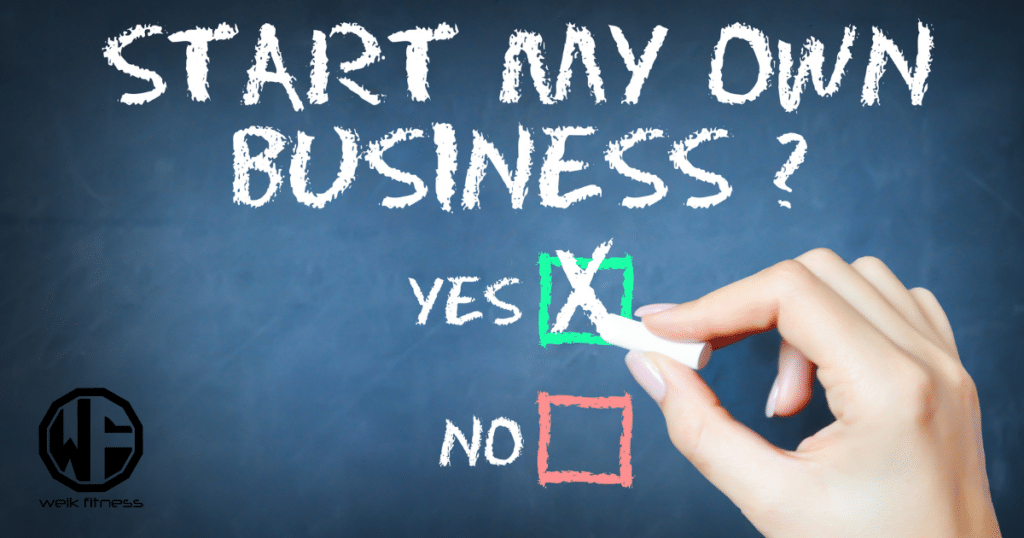5 Excuses That Are Preventing You from Starting Your Business
When people ask me what I do for a living and tell them I own and operate my own business, I seem to get the same question from everyone—when is the right time to consider starting a business or become an entrepreneur? This article will outline exactly the right time for you to move forward and build the business of your dreams.
So, here’s the answer to the million-dollar question, when is the right time to put the wheels in motion for starting your business? The answer is there is no “right time.” I wish it were that easy to have a definitive answer, but unfortunately, there isn’t one. Everyone (maybe even you) seem to come up with reasons why you can’t move forward with starting your business or starting your journey as an entrepreneur. Let’s outline some of the common excuses why many people say the time isn’t right for them to start their own business as well as some tips for getting started.
Table of contents

5 Excuses You Need to Ignore When Starting Your Business
Don’t make these excuses when starting your business!
Excuse #1: “I don’t know where to start”
While this may be true, it simply means you don’t have a true business plan or model just yet. If you don’t know where to start, then how do you even know where you want to go? How can you picture your business being successful without some type of roadmap? Sit down and decide what kind of business you would like to start up. Look at your competition in the space and figure out how you can differentiate yourself from them. If you’re building a mouse trap, make sure it’s a better mouse trap than what’s currently on the market and at a price point that makes sense and doesn’t price you right out of the market before the ink dries on your business license. Make sure you have a plan thought out from start to finish.
How will you start? How will you get your product or service out there? What marketing techniques are relevant to your target audience or consumer? Start up some social media pages once your business is established so that you can start getting the word out (for free). Engage your audience and customer base as much as possible. Word of mouth is a very powerful marketing technique and it just so happens to be free.
Most importantly, write everything down on paper. All of your ideas, thoughts, goals, aspirations, etc. I myself have a great memory, it’s just short. Keep a pen and little notepad with you at all times. Great ideas can flash before your eyes but if you get caught up in something else you might forget about the idea before you can write it down. POOF! Gone forever. For that reason, it’s important to carry around your pen and paper.
You also need to figure out where you are before you think about where you want to go. It’s not always about the destination, sometimes it’s about the journey. Don’t rush things. Enjoy the process of starting your business.
Excuse #2: “I have a great paying job I don’t want to give up”
If you have a great paying job that you love, do you really want to give that up? There ARE benefits to working for someone else, as are there benefits of working for yourself. You need to weigh out the pros and cons of both and decide if you would be willing to part ways with your current career to start something new. Where you currently work you probably have benefits, a 401K (potentially with matching), paid time off, and not to mention your employer takes care of half of your taxes.

But on the flip side, you have to report to your job every day at a certain time, sometimes you have meetings that require you to miss family time, maybe there’s travel involved that takes you away from home, and not to forget that everything you are doing is to help fund the owner’s retirement. All of your hard work is to fulfill someone else’s dream. That was one of the many reason’s I decided to start my own business. I look at it as investing in my future. The more effort I put into the business, the more reward at the end. When you work for someone else, you are probably paid by the hour or salaried and if you work harder, that doesn’t necessarily equate to a financial gain for you (unless you are in sales). With starting your business, the more time and effort you invest, the greater the potential for a return.
Starting your business and calling the shots will allow you freedom, the ability to make your own decisions on the direction of the business, the ability to make your own hours, but also the need for you to manage every aspect of the business yourself potentially for a little while until you can hire employees or maybe you decide to run the business yourself and take on ALL the responsibilities involved. Either way, you’re going to be paying more for taxes, funding your own retirement plan, as well as funding your own benefits if you aren’t married and have the ability to jump on your spouse’s plan. Have employees? Things get even more complicated as you need to pay a portion of their taxes, potentially give them benefits, etc. If you are just starting up, I’d recommend working alone at first until the time comes that warrants bringing on employees to help grow your business.
For me personally, when I decided to start my own business, Weik Fitness, LLC I had an amazing paying job with one of the largest sports nutrition companies in the world. But after about 10 years of working for the company, their vision no longer aligned with mine and I felt they weren’t utilizing me to my full potential and skillset with their new rebranding of the company. For that reason, we parted ways. Do I look back with regret? Nope. I love my newfound freedom that comes along with my business. I wake up every morning excited to walk into my office and work on projects.
While there’s more stress involved with owning my own business now, it’s a different kind of stress than what I was used to when working for someone else. This new stress was a way for me to learn new things, overcome obstacles, and truly find how mentally tough I am to move forward and change aspects of my business and services. And while you can read a million books on business, you really don’t get a good understanding of what you’re reading until you actually do it and put those words and ideas into action. As they say, on-the-job training is the best form of training. You can read until your eyes are crossed, but if you don’t learn through experience, then what you read are only words.
With all of that being said, only you can decide if it’s worth leaving a comfortable, good paying, and secure job to go after your dreams of starting a business. But do you really need to leave your current job at all? That leads us into our next topic.
Excuse #3: “Quitting your full-time job too early to start your business”
In my opinion, leaving a current job to start up your own business is a terrible idea—to start at least. You may be able to get away with starting your business and still maintaining their normal everyday 9-5 career. It all depends on how complex your business idea is. If it only requires you to work a couple hours every day, you can probably easily keep your day job and continue to work on and grow your own business.

Starting your business can take some time before you’re profitable, and if you need an income to keep a roof over your head, you can’t take on the risk of your new business not making money for a given period of time. For that reason, let your 9-5 job keep the roof over your head while you build your business and also let that job help fund your start-up.
Related Article: Unveiling Strategic Brilliance — Your Next Five Moves
However, if the growth of your business gets to the point where you can’t keep up, you need to decide at that point if it makes sense to make your business your full-time priority—meaning quitting your current job working for someone else or potentially hiring some help to assist with the day to day operations.
Excuse #4: “You know nothing about your channel or category”
Let’s use an example that I get asked a lot since I was in the sports nutrition (supplement) industry for so long. I get asked a lot what it takes to start your own supplement company. Everyone has a great idea of a product they want to bring to market and think it’s going to help them make millions. I ask them one simple question—who are the main distributors across the nation that can handle your specific product? Know what they say? “I don’t know”. That’s not the correct answer if you are considering starting your business.
You need to know the ins and outs of the business. Who are the main distributors for your specific category and channel? Who is capable of doing the manufacturing for your product? Who are your competitors? What are their prices? What are their costs (if you can gather that info)? Who are your competitors targeting? Is it the same group you are targeting or will you have a niche market? There are many questions to be asking yourself and if you don’t know the answer, you’re not ready yet. Go get those answers before doing anything else.

Jumping into a start-up without a business plan is like parachuting into the middle of the desert and trying to find your way out. Sure, you can go many different directions, but which one is the right path? Along the way you risk running out of water and becoming dehydrated—this is along the same lines of you running into an issue with the business that could be detrimental to your success. I’m not saying that you will plan for every hurdle or roadblock that you may come across with your start-up, but you need to have a good compass to keep moving in the right direction.
Excuse #5: “You don’t have the capital to start your business”
To be honest, welcome to the club. Many people who start a business for the first time aren’t millionaires with money to simply throw at a wall to see if it sticks. Save up little by little. You don’t need to be starting your business today, yet I wouldn’t let the passion you have for starting your own business slip away by dragging things out. Try to raise money if need be. If your business involves a product you are looking to create, maybe your best option would be a Kickstarter campaign. Or if that’s not your cup of tea then go the old fashion way by heading over to a financial institution and asking for a loan. While I personally feel starting a business on a loan is a terrible idea (the thought of starting a business already in debt doesn’t appeal to me), it might be the only way you can afford to do so at that point. Weigh your options and decide what makes the most sense for you in how you plan on raising capital to start up and keep your business operating.
While you’re waiting for money to fun your start-up, go back to the previous topic and keep chipping away at your business plan. Get everything in order so when you have the funds, you can pay to get your business license, insurance, website, and everything else that you’ll need to get your business off the ground. Rome wasn’t built in a day, and neither will your business be. Don’t get frustrated at how long some facets of starting your business might take. Stay calm and committed to growing your business and great things may come your way. Never give up and never give yourself an excuse why you shouldn’t start up a business if that is a goal and passion of yours. Follow your dreams and don’t let anyone tell you that you can’t do something.


*Disclosure: This article may contain affiliate links or ads, which means we earn a small commission at no extra cost to you if you make a purchase through these links. These commissions help support the operation and maintenance of our website, allowing us to continue producing free valuable content. Your support is genuinely appreciated, whether you choose to use our links or not. Thank you for being a part of our community and enjoying our content.
PLEASE CONSIDER SHARING THIS ON YOUR SOCIAL MEDIA TO HELP OTHERS LEARN MORE ABOUT THIS TOPIC.





